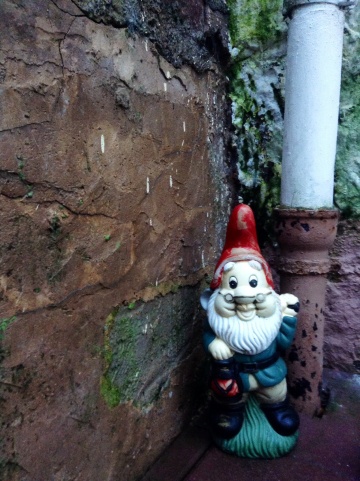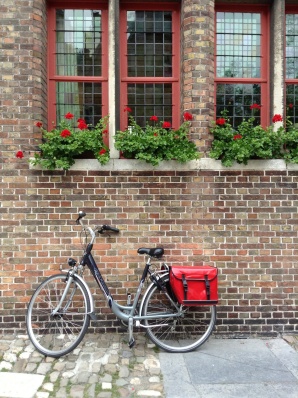The first thing I realized about Germany was how wrong Americans were about it.
Growing up, I always knew Germans were brilliant, logical beings with an eye for really fast cars. Einstein in a BMW, right? My best friend as a child was German; her family was on a work visa, and I spent many a day listening to “Das Blau”, eating the most amazing spaetzle and reading German comics, surrounded by the arguments of syntax in a family split between West and East German dialects.
To top it off, we still stay in touch with family in Baumberg, and we have letters tracing back to WWII between us. So when I got an assignment in the military to Germany, I couldn’t be more thrilled. It would be like going home, I thought.
When I shared the joyous news with an engineer buddy who worked in Germany as a civilian for a while, he sarcastically told me I was in for a treat.
“They just don’t do things the same way. I want to go from A to C if it makes sense, but they have to go from A to B to C, no matter what.”
Puzzled at his observation, so at odds with what I saw as German, I shrugged it off and tried to study the German umlaut.
[Okay, so not the best example of something UN-frustrating. Many a German has giggled at my attempt to say “müll” or trash.]
And then, once I landed and settled into a surprisingly verdant, Grimms-like landscape amongst the rural population of a small German village, I realized what everyone was trying to tell me: Germany is different. Germany is not America. And America’s perspective of Germany as a nation? So wrong.

A German gnome watches from the corner. My village Malberg was a battlefield between Americans and Germans during both wars. The Germans of modern day value their homes and property, and spend a lot of time decorating and maintaining their homes.
This loquacious writer named Homi Bhabha proposes the concept of a national narrative, one crafted by the dominant culture to represent the whole nation’s identity, and that sometimes contrasts with the individual narrative. In America, we see Germany as a super-efficient, hard-working country.
Part of the national narrative is one of productive, strict people who economically support the European Union.
But in America, hard work means long hours. It means the customer is always right. It means Americans are right.
In Germany, especially in rural western Germany, stores close by 6 p.m. German employees on the U.S. military base go home exactly when they should, leaving the unfinished work for tomorrow. Waiters don’t come to your table but twice or thrice during the course of a three-hour dinner. Your landlord would effectively fulfill their contract by fixing your pipe when requested, but wouldn’t spend their Saturday planting your entire backyard. And you most definitely cannot put five chairs at a four-chair table…it is just “not possible.”
Oftentimes, I would be able to tell how Americans felt about Germans and Europeans by the words they chose to use. As David Spurr puts it, there is “power inherent in all discourse.” Through language and syntax, I heard the echoes of cultural dominance. I saw how how language shapes narrative, concept of self, concept of others and reality for many.
“Germans are lazy!” some of my American friends would complain. “They are so stingy and rude! They don’t value customer service!” In a way, these could be true. These were, if you didn’t translate their lack of “hard work” for their passion for family and community, or their “rudeness” for their bold genuine spirit, or their “lack of customer service” as a commitment to privacy. The American perspective of Germany varied, depending on the person, but largely, it was difficult not to notice a trend of bitterness and condescension of some sort, whether it be directed at America or Europe.

A Hellenistic statue in the Louvre, just the place a Number One has to go a thousand times, and then tell everyone the new pieces of art they discovered.
In my experience, there were often four kinds of Americans living in Germany, thanks to the military:
1) Those who loved Germany, and hated America
2) Those who hated Germany, and loved America
3) Those who didn’t even try
4) Those who embraced it, good and bad
I can’t say I didn’t understand where most of these people were coming from (except the Number Threes. No idea.), but what was most unique was why they saw what they saw.
For the Number Ones, Europe was it. The food, the wine, the pace of life, the focus on social support…that was how it should be. Americans, they would say with a shake of their lovely heads, are so pastiche. If they could, they would become expatriates. After all, see how thin everyone is. See how happy we all are. We slip from café to café along the cobble stoned streets of ancient towns, breathing in history and art and culture. What do you do, they ask Number Twos, watch television, speak only one language and drink bad beer?
Number Twos have a common phrase: back-to-back world champs, a rather casual reference to the devastation of two world wars, the remnants of these still evident in the narratives, faces and villages of Europe. Number Twos would long for the freedom of guns and cheap gas and open range of wildness. In America, there are no silly rules of noise pollution or environmental restrictions (“you mean, I have to sort my trash??”). The stores and restaurants are open at times that make sense, the roads are normal size for normal cars, and back home, your neighbor would never tell you to follow the rules about caging your dog. And all these rules! You’d think they would learn better from that last big war…blindly following stupid rules doesn’t end well for anyone.
Number Threes are quite beyond my comprehension, as those who don’t even try to enjoy themselves. Most of the time, it would be younger Airmen who were afraid to do anything by themselves off the base, and would fear the changes this new, unfamiliar place. Even the famous Autobahn would be beyond them. “It’s too fast,” they would grumble, and shift in their seat nervously.
Number Fours…well, we are the nerds. The ones who went through all the Numbers, to land here, the Lucky Fourth. We have gone through the stages of culture shock and made it out the other end. We don’t despair for America, although we desperately miss Chic-fil-a and hot summers. Oftentimes, as Susan Bassenett bring up in her article about females in travel, the Number Fours were defined by their society and not their internal personality, and so we used travel to redefine who we were, outside of the frame of reference. We discovered ourselves anew.
We find ourselves surprised by the Germans; they are incredibly dedicated to having a great time, no matter their age. They are generous of spirit, and will become fast friends with you once you open up to each other. They work hard, but they value more than an identity in your job. They value the community they are a part of…they value citizenship and rules, because it requires them to respect each other, no matter what. They are boisterous and engaging, smart and educated on your political system more than you could be. And they remind you, with a humility that moves you, that no one won the world wars…that there is no such thing as a champion in the face of such pain and devastation.

An American cemetery, the last resting place of thousands of U.S. military members who fought in World War II.
Even through the lens of a Number Four, oftentimes America’s aggressive, persistent cultural ideals impacted how I saw the world, and other cultures. Sometimes, I struggled to see the value of some of the differences. Sometimes, I was incredibly frustrated with my German colleagues for their pace of work or amazing habit of taking the most vacation possible (seriously, they have so many holidays!). But then I take a step back from myself, my beliefs and my perspective…and I think, perhaps there is value to what they value.
Back to art and culture, sighs the Number One with a chilled glass of Epernay’s finest champagne.
Back-to-back world champs, says the Number Two determinedly, crushing a beer on his forehead.
Back to America please, whines the long-suffering Number Three while playing the X-Box.
Back-to-back with the Germans, Number Four resolutely states, and a piece of her heart settles further into its home away from home.
Side note…here are the stages of culture shock, for those who have yet to experience the roller coaster that it is:
Step 1: The Honeymoon Stage- when everything is awesome.
Step 2: The Distress Stage- when differences aren’t so fun anymore.
Step 3: Re-integration Stage- when you hate everything new and compare it to the better homeland (aka, when you adjust and see what you value about your culture)
Step 4: Autonomy Stage- when you accept your new home and begin to appreciate where you are
Step 5: Independence Stage- when you are yourself again, and embrace the culture around you in a realistic light
Have you, dear readers, experienced any of these aspects of culture shock?

